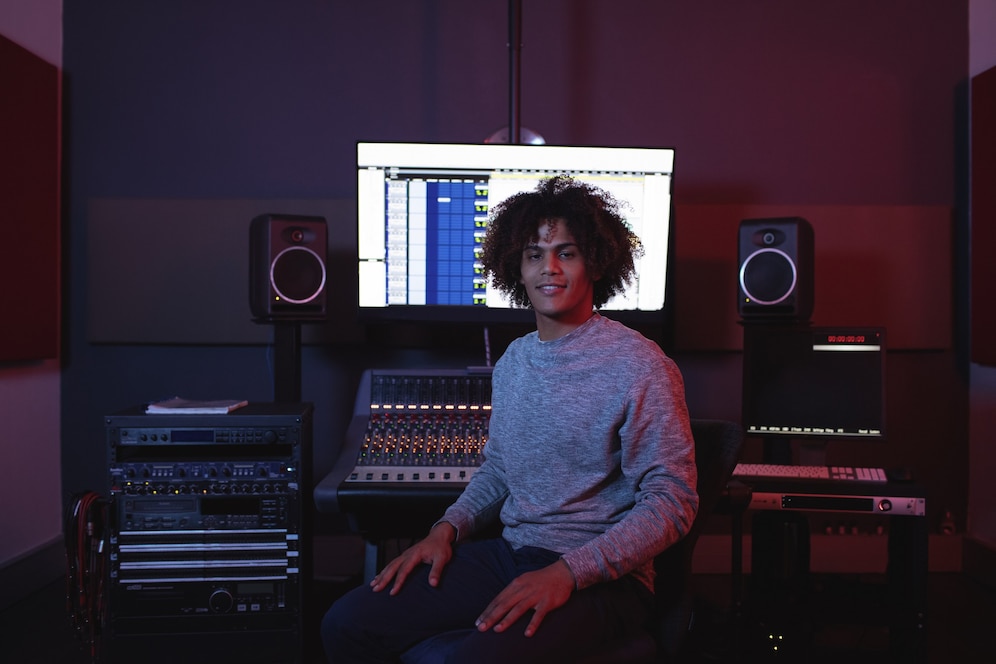Music. It has been a universal language throughout history, full of emotions, culture, and creativity. With the advent of new technology, the realm of music has shifted dramatically in the modern era. At the heart lies the burgeoning world of mixing and mastering. This complex process of creating sonic perfection involves stages like mixing and mastering, layering, and much more.
The Basic Difference between Mixing and Mastering
Understanding the basic difference between mixing and mastering is essential when diving into audio engineering. In simple terms, mixing is balancing all separate tracks in a song. In contrast, mastering is the final stage, where the track is polished to ensure it sounds balanced and harmonious across various playback systems.
Defining Mixing: Turning Chaos into Sonic Perfection
The first stage of mixing mastering is mixing. Mixing is all about turning the chaotic assembly of individual sounds into a harmonious, pleasing-to-the-ear audio file. Professional mixing involves the balanced control of factors like volume, pan position, and frequency content.
Delving Deeper into Audio Engineering: The Story of Sound Optimization
Moving ahead, sound optimization under the umbrella of Audio Engineering proves to be an essential aspect that ensures the perfect balance within every track. It uses various pro audio tools to fine-tune the sweet spot, preparing the track for Studio production.
The Role of Pro Audio Tools in Studio Production
In Studio production, achieving sound optimization within every track is challenging. This is where pro audio tools come into play. They help optimize the fine details, perfecting your tracks’ balance, timbre, and stereo field.
The Art of Mixing: Techniques and Strategies Explained
This leads us to explore various mixing techniques that you can use to excel at mixing mastering. These techniques include using EQs to balance frequencies, utilizing compression for dynamic range control, and placing elements within the stereo field using the panning control. Unraveling these mastering secrets makes the audio sound-ready for mastering.
Unmasking Mastering Secrets for Professional Mixing
Unmasking the mastering secrets of professional mixing is carefully applying the final touches to a mix. This involves sequencing the tracks along with transitions, adjusting volume, and applying any final EQ or compression the track may need.
The Journey to Music Production Mastery: The Importance of Mastering Skills
On the path to achieving music production mastery, your mastering skills play an extremely crucial role. They help encapsulate the mixed audio, control the dynamics, polish off any rough edges, and, most importantly, ensure compatibility across multiple playback formats.
Studio Mastering: The Road to Audio Enhancement
If you’re choosing the path of mastery, then studio mastering is the crossroads. It’s where the all-important audio enhancement happens. This is where the mixing mastering process brings out the character of the music, balancing and polishing it to ensure it is ‘radio ready.’
The Role of Mastering Engineers: Perfecting Sounds with Science
At the helm of the mastering process are engineers who utilize their vast knowledge of audio, advanced engineering skills, and top-tier equipment to ensure the mix sounds its best. They bring their expertise by applying the appropriate studio mastering techniques and using specialized mixing software.
Studio Mastering Techniques to Achieve Audio Clarity
Studio mastering techniques include limiters, equalizers, compressors, and stereo enhancers to achieve audio clarity. It maximizes loudness, prevents clipping, enhances stereo width, and ensures audio quality.
The Software behind Mastering Music: An Overview of Mixing Software
The magic behind mastering music is both an art and a science. Today’s mixing software provides countless possibilities to mold your raw recording into the final masterpiece, known as sound mastering.
Sound Mastering: The Last Step to Sonic Perfection
Sound mastering is quintessential, often called the final step leading to sonic perfection. It provides the polish, the shine, the high-res audio, and the things we expect when we hit play on a professionally produced track.
What Does It Mean to Master a Track?
To master a track effectively, you must look into the music producer’s toolkit. It involves the post-production processes where the song is mastered to ensure the correct balance of levels, equalization, stereo enhancement, and audio enhancement.
Music Production Secrets: Inside the Producer’s Toolkit
As part of the music production secrets, the producer’s toolkit is filled with resources like EQ plugins, mastering tools, compressors, limiters, and much more. These combine to make sound mastering more precise and efficient.

Audio Post-Production: The Final Frontier of Studio Sound Design
After mastering music, you enter the world of audio post-production. It’s the final frontier of studio sound design, involving creating soundtracks by synchronizing recording with the moving image.
Studio Quality Optimization: The Sweet Spot of Audio Processing
Studio quality optimization is the sweet spot for audio processing in this terrain. It involves techniques that enhance the sound quality and ensure perfectly balanced and equalized.
Unfolding the process of Sound Mastering
Finally, to complete the music production process, one must decode the sound mastering process. It involves transferring the audio from a source containing the final mix to a data storage device, the master.
Get to Know the Mastering Tools Essential for Professionals
For professional audio engineers, mastering is only complete with the right tools. These tools are the building blocks to mastering music; they help control music’s dynamics, balance, and overall sonic character.
The Fundamentals of Mastering: Steps & Techniques
The fundamentals of mastering involve various steps & techniques. From optimizing average and peak volume levels to spatially enhancing and widening the stereo image, the steps to mastering aim at realizing the full potential of the audio.
Conquering Audio Enhancement: Why Master Your Tracks?
That brings us to the final question: Why master your tracks? The answer is simple- audio enhancement. Mastering ensures your tracks sound as good as possible on all playback systems, platforms, and media formats. Music with mastering would have the cohesive feel, depth, and volume necessary for a professional sound.

